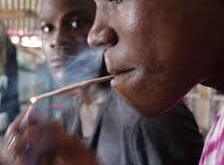Liberia’s fight against drug abuse has hit a major stumbling block after 485 of the 600 youths enrolled in a government-backed detoxification and rehabilitation program abandoned the process.
By: Kruah Thompson
Monrovia, September 1, 2025: According to the Multi-Sectoral Committee on Drugs, only 115 youths remain in the program, which was designed to offer treatment and recovery services to some of the country’s most vulnerable.
“From the start, we had about 600 youths in the program. But as of yesterday, the number dropped to 115 (105 males and 10 females),” said Jewel Tarpeh Kollie, Montserrado County Health Officer. “Sometimes you see the number increase, and other times it decreases, because the process is voluntary and many of them walk away.”
Liberia’s rehabilitation initiative, launched earlier this year, has faced challenges from the onset. Youths undergoing detoxification often experience severe withdrawal symptoms, which require specialized treatment. While those with mild conditions are treated on an outpatient basis, many relapse after returning to the communities and ghettos they came from. This is an issue that other privately owned rehabilitation centers have also complained about.
Speaking at the Ministry of Information’s regular Thursday press briefing on August 28, 2025, Laraamand Nyonton, Deputy Minister for Technical and Vocational Education and Training (TVET) at the Ministry of Youth and Sports, and member of the Multi-Sectoral Committee, disclosed that many of the youths abandoned the program despite its intended purpose.
“The issue of rehabilitation is voluntary. We cannot force anyone to stay,” said Laraamand Nyonton, Deputy Minister for TVET at the Ministry of Youth and Sports. “This is a temporary camp, so if they see the need to be treated, they stay; but if they choose to leave, they walk away.”
Additionally, he acknowledged that inadequate facilities, including malfunctioning toilets and a limited supply of food and water, have hindered the program. And though the Liberia Water and Sewer Corporation (LWSC) has promised to intervene, the conditions have already made retention difficult.
Currently, the government operates a temporary holding center at the Liberia Refugee Repatriation and Resettlement Commission (LRRRC) compound, with support from organizations such as Lady of Light. Plans are underway for a permanent rehabilitation facility; however, no concrete timeline has been established.
At the treatment centers, teams of nurses, psychologists, psychiatrists, and even recovered addicts serve as counselors. But experts say Liberia’s drug crisis requires more than stopgap measures.
Drug abuse, particularly the use of synthetic substances like “Kush,” has surged across Liberia in recent years. Thousands of disadvantaged youth, commonly referred to as “zogos,” remain on the streets, with limited access to healthcare, education, or employment opportunities.
President Joseph Boakai’s administration has pledged to prioritize drug rehabilitation and community reintegration programs, thereby establishing a Multi-Sectoral Committee.
The Committee, composed of officials from the health, security, and youth sectors, was tasked with implementing a national anti-drug plan.
The plan was recently launched, but the mass desertion of the detoxification program raises challenging questions about whether Liberia is truly prepared to confront the depth of its addiction crisis.
For now, only 115 youths remain in the program, with the risk that even those could soon slip away. – Edited by Othello B. Garblah.
 JamzNG Latest News, Gist, Entertainment in Nigeria
JamzNG Latest News, Gist, Entertainment in Nigeria









